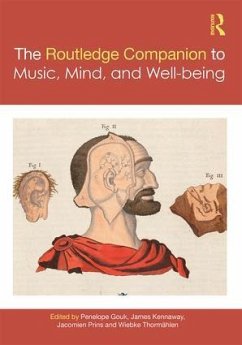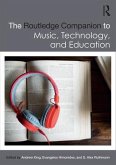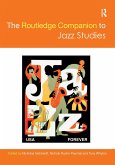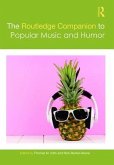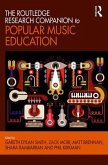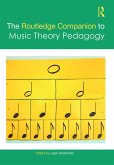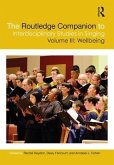The Routledge Companion to Music, Mind, and Well-being
Herausgeber: Gouk, Penelope; Prins, Jacomien; Kennaway, James
The Routledge Companion to Music, Mind, and Well-being
Herausgeber: Gouk, Penelope; Prins, Jacomien; Kennaway, James
- Gebundenes Buch
- Merkliste
- Auf die Merkliste
- Bewerten Bewerten
- Teilen
- Produkt teilen
- Produkterinnerung
- Produkterinnerung
The Routledge Companion to Music, Mind, and Wellbeing seeks to foster truly interdisciplinary approaches to key questions about the nature of musical experience, and to demonstrate the importance of the conceptual and ideological frameworks underlying research in this field.
Andere Kunden interessierten sich auch für
![The Routledge Companion to Music, Technology, and Education The Routledge Companion to Music, Technology, and Education]() The Routledge Companion to Music, Technology, and Education295,99 €
The Routledge Companion to Music, Technology, and Education295,99 €![The Routledge Research Companion to Johann Sebastian Bach The Routledge Research Companion to Johann Sebastian Bach]() The Routledge Research Companion to Johann Sebastian Bach298,99 €
The Routledge Research Companion to Johann Sebastian Bach298,99 €![The Routledge Companion to Jazz Studies The Routledge Companion to Jazz Studies]() The Routledge Companion to Jazz Studies285,99 €
The Routledge Companion to Jazz Studies285,99 €![The Routledge Companion to Popular Music and Humor The Routledge Companion to Popular Music and Humor]() The Routledge Companion to Popular Music and Humor295,99 €
The Routledge Companion to Popular Music and Humor295,99 €![The Routledge Research Companion to Popular Music Education The Routledge Research Companion to Popular Music Education]() The Routledge Research Companion to Popular Music Education298,99 €
The Routledge Research Companion to Popular Music Education298,99 €![The Routledge Companion to Music Theory Pedagogy The Routledge Companion to Music Theory Pedagogy]() The Routledge Companion to Music Theory Pedagogy285,99 €
The Routledge Companion to Music Theory Pedagogy285,99 €![The Routledge Companion to Interdisciplinary Studies in Singing, Volume III The Routledge Companion to Interdisciplinary Studies in Singing, Volume III]() The Routledge Companion to Interdisciplinary Studies in Singing, Volume III285,99 €
The Routledge Companion to Interdisciplinary Studies in Singing, Volume III285,99 €-
-
-
The Routledge Companion to Music, Mind, and Wellbeing seeks to foster truly interdisciplinary approaches to key questions about the nature of musical experience, and to demonstrate the importance of the conceptual and ideological frameworks underlying research in this field.
Hinweis: Dieser Artikel kann nur an eine deutsche Lieferadresse ausgeliefert werden.
Hinweis: Dieser Artikel kann nur an eine deutsche Lieferadresse ausgeliefert werden.
Produktdetails
- Produktdetails
- Verlag: Routledge
- Seitenzahl: 350
- Erscheinungstermin: 13. Dezember 2018
- Englisch
- Abmessung: 260mm x 183mm x 23mm
- Gewicht: 854g
- ISBN-13: 9781138057760
- ISBN-10: 1138057762
- Artikelnr.: 54803676
- Herstellerkennzeichnung
- Libri GmbH
- Europaallee 1
- 36244 Bad Hersfeld
- gpsr@libri.de
- Verlag: Routledge
- Seitenzahl: 350
- Erscheinungstermin: 13. Dezember 2018
- Englisch
- Abmessung: 260mm x 183mm x 23mm
- Gewicht: 854g
- ISBN-13: 9781138057760
- ISBN-10: 1138057762
- Artikelnr.: 54803676
- Herstellerkennzeichnung
- Libri GmbH
- Europaallee 1
- 36244 Bad Hersfeld
- gpsr@libri.de
Penelope Gouk is Honorary Research Fellow at the University of Manchester, UK, where she lectured until her retirement. Throughout her career the dominant theme of her research has been the intellectual history of music in early modern science and medicine. Most recently she has been investigating changing explanations for music's emotional effects, especially in Britain. Her publications include Music, Science and Natural Magic in Seventeenth-Century England (1999) and edited volumes Musical Healing in Cultural Contexts (2000) and, with Helen Hills Representing Emotions: New Connections in the Histories of Art, Music and Medicine (2005). James Kennaway is Senior Research Fellow at the University of Roehampton in London, UK. He has written extensively on the history of medicine and music, notably in his 2012 monograph Bad Vibrations: The History of the Idea of Music as a Cause of Disease. Jacomien Prins is Assistant Professor/Researcher at the Ca'Foscari University of Venice, Italy. She has worked extensively on the interaction between music theory and philosophy in the Renaissance. Her work includes Echoes of an Invisible World: Marsilio Ficino and Francesco Patrizi on Cosmic Order and Music Theory (2014), Sing Aloud Harmonious Spheres: Renaissance Conceptions of Cosmic Harmony (2017), and an edition and translation of Marsilio Ficino's commentary on Plato's Timaeus (Harvard University Press, the I Tatti Renaissance Library series (ITRL)). Wiebke Thormählen is Area Leader in History at the Royal College of Music in London, UK. Her research focuses on the formulation of music as a language of emotions and its particular role in educational theories and policies since the eighteenth century. Recently awarded a three-year collaborative research grant from the Arts and Humanities Research Council (Music, Home and Heritage: Sounding the Domestic in Georgian Britain) she explores the interaction of the domestic with the public in musical arrangements, in devotional music and in the relationship between music as domestic social activity and amateur choral societies in Britain.
1. Introduction: Historical and Contemporary Perspectives on Music, Mind
and Well-being (Penelope Gouk, James Kennaway, Jacomien Prins and Wiebke
Thormählen) SECTION ONE: From Antiquity to the Twentieth Century 2. Music,
Mind and Well-being in Antiquity (Francesco Pelosi) 3. The Regulative Power
of the Harmony of the Spheres in Medieval Latin, Arabic and Persian Sources
(Andrew Hicks) 4. Girolamo Cardano on Music as a Remedy "For the Troubles
that Result from the Misery of Human Misfortune" (Jacomien Prins) 5.
Melancholy, Music and the Passions in English Culture Around 1600 (
Penelope Gouk) 6. Musical Glasses, Metal Reeds and Broken Hearts: Two Cases
of Melancholia Treated by New Musical Instruments (Carmel Raz and Stanley
Finger) 7. Framing Emotional Responses to Music: Music-making and Social
Well-being in Early Nineteenth-Century England (Wiebke Thormählen) 8. The
Use of Music as a Treatment for Gemüthskrankheit in Nineteenth-century
Viennese Psychiatry (Andrea Korenjak) 9. Anna O.'s Nervous Cough:
Historical Perspectives on Neurological and Psychological Approaches to
Music (James Kennaway) 10. "What Is This Music Doing to Me?": Psychological
Experiments on the Effects of Music on Mood in the First Half of the
Twentieth Century (Marta García Quiñones) 11. Music, Body and Emotion
Between Well-being, Manipulation and Torture in the Twentieth Century (
Juliane Brauer) SECTION TWO: The Twenty-first Century 12. Emotional
Accounts of Musical Experience and Musical Object: On the Relationship
Between Music and Emotion (Elvira Di Bona) 13. Understanding Music, Mind
and Emotion from the Perspective of Psychoneuroimmunology (Daisy Fancourt)
14. Approaches to Music, Well-being and Emotion from Psychology: Theory,
Method and Evidence (Alexandra Lamont) 15. Please Please Me! The Pleasure
of Music in the Brain (Ole A. Heggli, Morten L. Kringelbach and Peter Vuust
) 16. Three Controversies of Music and Emotions: Neuroscience and the
Psychology of Sadness and Music (Tuomas Eerola) 17. Why We Listen to
Sad-Sounding Music: Philosophical Perspectives, Psychological Functions and
Underlying Brain Mechanisms (Liila Taruffi and Stefan Koelsch) 18. When
Emotional Character Does Not Suffice: The Dimension of Expressiveness in
the Cognitive Processing of Music and Language (Ariadne Loutrari and
Marjorie Lorch) 19. Musical Engagement and Well-being in the Early Years of
Life (Beatriz Ilari) 20. Music, Emotion and Learning (Jennie Henley) 21.
Music, Cognition and Well-being in the Ageing (Susan Hallam) 22. The
Goodness of Small Things: Why We Need Longitudinal and Ethnographic Studies
of Music in Dementia Care (Mariko Hara and Tia DeNora)
and Well-being (Penelope Gouk, James Kennaway, Jacomien Prins and Wiebke
Thormählen) SECTION ONE: From Antiquity to the Twentieth Century 2. Music,
Mind and Well-being in Antiquity (Francesco Pelosi) 3. The Regulative Power
of the Harmony of the Spheres in Medieval Latin, Arabic and Persian Sources
(Andrew Hicks) 4. Girolamo Cardano on Music as a Remedy "For the Troubles
that Result from the Misery of Human Misfortune" (Jacomien Prins) 5.
Melancholy, Music and the Passions in English Culture Around 1600 (
Penelope Gouk) 6. Musical Glasses, Metal Reeds and Broken Hearts: Two Cases
of Melancholia Treated by New Musical Instruments (Carmel Raz and Stanley
Finger) 7. Framing Emotional Responses to Music: Music-making and Social
Well-being in Early Nineteenth-Century England (Wiebke Thormählen) 8. The
Use of Music as a Treatment for Gemüthskrankheit in Nineteenth-century
Viennese Psychiatry (Andrea Korenjak) 9. Anna O.'s Nervous Cough:
Historical Perspectives on Neurological and Psychological Approaches to
Music (James Kennaway) 10. "What Is This Music Doing to Me?": Psychological
Experiments on the Effects of Music on Mood in the First Half of the
Twentieth Century (Marta García Quiñones) 11. Music, Body and Emotion
Between Well-being, Manipulation and Torture in the Twentieth Century (
Juliane Brauer) SECTION TWO: The Twenty-first Century 12. Emotional
Accounts of Musical Experience and Musical Object: On the Relationship
Between Music and Emotion (Elvira Di Bona) 13. Understanding Music, Mind
and Emotion from the Perspective of Psychoneuroimmunology (Daisy Fancourt)
14. Approaches to Music, Well-being and Emotion from Psychology: Theory,
Method and Evidence (Alexandra Lamont) 15. Please Please Me! The Pleasure
of Music in the Brain (Ole A. Heggli, Morten L. Kringelbach and Peter Vuust
) 16. Three Controversies of Music and Emotions: Neuroscience and the
Psychology of Sadness and Music (Tuomas Eerola) 17. Why We Listen to
Sad-Sounding Music: Philosophical Perspectives, Psychological Functions and
Underlying Brain Mechanisms (Liila Taruffi and Stefan Koelsch) 18. When
Emotional Character Does Not Suffice: The Dimension of Expressiveness in
the Cognitive Processing of Music and Language (Ariadne Loutrari and
Marjorie Lorch) 19. Musical Engagement and Well-being in the Early Years of
Life (Beatriz Ilari) 20. Music, Emotion and Learning (Jennie Henley) 21.
Music, Cognition and Well-being in the Ageing (Susan Hallam) 22. The
Goodness of Small Things: Why We Need Longitudinal and Ethnographic Studies
of Music in Dementia Care (Mariko Hara and Tia DeNora)
1. Introduction: Historical and Contemporary Perspectives on Music, Mind
and Well-being (Penelope Gouk, James Kennaway, Jacomien Prins and Wiebke
Thormählen) SECTION ONE: From Antiquity to the Twentieth Century 2. Music,
Mind and Well-being in Antiquity (Francesco Pelosi) 3. The Regulative Power
of the Harmony of the Spheres in Medieval Latin, Arabic and Persian Sources
(Andrew Hicks) 4. Girolamo Cardano on Music as a Remedy "For the Troubles
that Result from the Misery of Human Misfortune" (Jacomien Prins) 5.
Melancholy, Music and the Passions in English Culture Around 1600 (
Penelope Gouk) 6. Musical Glasses, Metal Reeds and Broken Hearts: Two Cases
of Melancholia Treated by New Musical Instruments (Carmel Raz and Stanley
Finger) 7. Framing Emotional Responses to Music: Music-making and Social
Well-being in Early Nineteenth-Century England (Wiebke Thormählen) 8. The
Use of Music as a Treatment for Gemüthskrankheit in Nineteenth-century
Viennese Psychiatry (Andrea Korenjak) 9. Anna O.'s Nervous Cough:
Historical Perspectives on Neurological and Psychological Approaches to
Music (James Kennaway) 10. "What Is This Music Doing to Me?": Psychological
Experiments on the Effects of Music on Mood in the First Half of the
Twentieth Century (Marta García Quiñones) 11. Music, Body and Emotion
Between Well-being, Manipulation and Torture in the Twentieth Century (
Juliane Brauer) SECTION TWO: The Twenty-first Century 12. Emotional
Accounts of Musical Experience and Musical Object: On the Relationship
Between Music and Emotion (Elvira Di Bona) 13. Understanding Music, Mind
and Emotion from the Perspective of Psychoneuroimmunology (Daisy Fancourt)
14. Approaches to Music, Well-being and Emotion from Psychology: Theory,
Method and Evidence (Alexandra Lamont) 15. Please Please Me! The Pleasure
of Music in the Brain (Ole A. Heggli, Morten L. Kringelbach and Peter Vuust
) 16. Three Controversies of Music and Emotions: Neuroscience and the
Psychology of Sadness and Music (Tuomas Eerola) 17. Why We Listen to
Sad-Sounding Music: Philosophical Perspectives, Psychological Functions and
Underlying Brain Mechanisms (Liila Taruffi and Stefan Koelsch) 18. When
Emotional Character Does Not Suffice: The Dimension of Expressiveness in
the Cognitive Processing of Music and Language (Ariadne Loutrari and
Marjorie Lorch) 19. Musical Engagement and Well-being in the Early Years of
Life (Beatriz Ilari) 20. Music, Emotion and Learning (Jennie Henley) 21.
Music, Cognition and Well-being in the Ageing (Susan Hallam) 22. The
Goodness of Small Things: Why We Need Longitudinal and Ethnographic Studies
of Music in Dementia Care (Mariko Hara and Tia DeNora)
and Well-being (Penelope Gouk, James Kennaway, Jacomien Prins and Wiebke
Thormählen) SECTION ONE: From Antiquity to the Twentieth Century 2. Music,
Mind and Well-being in Antiquity (Francesco Pelosi) 3. The Regulative Power
of the Harmony of the Spheres in Medieval Latin, Arabic and Persian Sources
(Andrew Hicks) 4. Girolamo Cardano on Music as a Remedy "For the Troubles
that Result from the Misery of Human Misfortune" (Jacomien Prins) 5.
Melancholy, Music and the Passions in English Culture Around 1600 (
Penelope Gouk) 6. Musical Glasses, Metal Reeds and Broken Hearts: Two Cases
of Melancholia Treated by New Musical Instruments (Carmel Raz and Stanley
Finger) 7. Framing Emotional Responses to Music: Music-making and Social
Well-being in Early Nineteenth-Century England (Wiebke Thormählen) 8. The
Use of Music as a Treatment for Gemüthskrankheit in Nineteenth-century
Viennese Psychiatry (Andrea Korenjak) 9. Anna O.'s Nervous Cough:
Historical Perspectives on Neurological and Psychological Approaches to
Music (James Kennaway) 10. "What Is This Music Doing to Me?": Psychological
Experiments on the Effects of Music on Mood in the First Half of the
Twentieth Century (Marta García Quiñones) 11. Music, Body and Emotion
Between Well-being, Manipulation and Torture in the Twentieth Century (
Juliane Brauer) SECTION TWO: The Twenty-first Century 12. Emotional
Accounts of Musical Experience and Musical Object: On the Relationship
Between Music and Emotion (Elvira Di Bona) 13. Understanding Music, Mind
and Emotion from the Perspective of Psychoneuroimmunology (Daisy Fancourt)
14. Approaches to Music, Well-being and Emotion from Psychology: Theory,
Method and Evidence (Alexandra Lamont) 15. Please Please Me! The Pleasure
of Music in the Brain (Ole A. Heggli, Morten L. Kringelbach and Peter Vuust
) 16. Three Controversies of Music and Emotions: Neuroscience and the
Psychology of Sadness and Music (Tuomas Eerola) 17. Why We Listen to
Sad-Sounding Music: Philosophical Perspectives, Psychological Functions and
Underlying Brain Mechanisms (Liila Taruffi and Stefan Koelsch) 18. When
Emotional Character Does Not Suffice: The Dimension of Expressiveness in
the Cognitive Processing of Music and Language (Ariadne Loutrari and
Marjorie Lorch) 19. Musical Engagement and Well-being in the Early Years of
Life (Beatriz Ilari) 20. Music, Emotion and Learning (Jennie Henley) 21.
Music, Cognition and Well-being in the Ageing (Susan Hallam) 22. The
Goodness of Small Things: Why We Need Longitudinal and Ethnographic Studies
of Music in Dementia Care (Mariko Hara and Tia DeNora)

